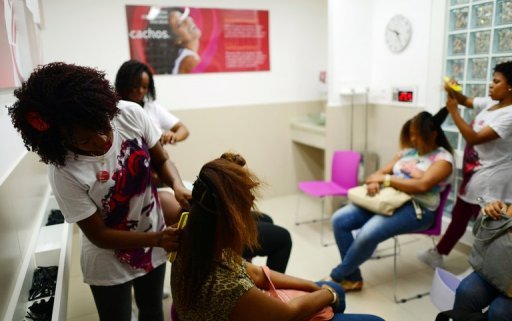
“In Brazil there is cultural baggage among black women who do not like their hair because it is not straight, which is the best known standard of beauty”, said Almeida, who co-authored a thesis on Beleza Natural and its support for the bottom of the social pyramid.
“And that is the difference with Beleza Natural, which does not want to straighten hair. It wants to relax it, to soften the curls. It says this to a woman: ‘You are beautiful because you are black. You are beautiful because you have hair like this.'”
Bruna Mara, a customer in Cachambi, a working class neighborhood north of Rio, confirmed this. “I always straightened my hair,” she said. “Here they convinced me that my curls would look pretty, and it is more natural,” said the 24-year-old secretary.
“There was no place that treated a black woman with afro hair like a princess,” said Cunha.
Walk into a Beleza Natural outlet and indeed it is easy to feel like a queen for a day.
Everything is decorated in red and pink, there are mirrors everywhere and spotlights, with fresh cut flowers and free coffee. You could be some place posh anywhere in the world, or on stage in a soap opera.
“There are full length mirrors because many clients do not have them at home,” said Velez.

Jose Jorge de Carvalho, an anthropologist at the University of Brasilia, says that even though Brazil is held up as an example of harmonious racial diversity it is actually “very racist”.
“These hair salons are part of an effort to fight racism, to lift the self-esteem of black women of the working class,” said Carvalho.
He deplored the use of irons to straighten hair, some of which are heated right over open fires and can “fry the hair”.
As it stands, Beleza Natural says it styles the hair of 90,000 Brazilian woman per month.
“This is the new middle class, producing for the new middle class,” said Marcelo Neri, acting minister of Strategic Issues, in comments to AFP.
The incomes of blacks and mulatos grew more between 2001 and 2009 than those of other races — at 43 and 48 percent respectively, compared to 21 percent for whites, said Neri, Brazil’s leading expert on the middle class.
But the inequities are still howling. Whites in Brazil earn on average nearly twice as much as blacks.
“The lower middle class learned for a long time to live with little, and now they have a little bit extra that lets them do what they want,” said Neri.
Getting your hair done at Beleza Natural is affordable but not cheap. It costs 38 dollars (29 euros), which is 10 percent of the minimum monthly wage, and maintaining the look at home requires products that cost $25 a month.
Still, most customers pay in cash — yet another sign of the real increase in purchasing power of the new Brazilian middle class.
